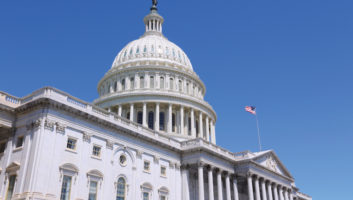 The House Antitrust Subcommittee Majority Report on competition in online markets drew mixed reactions inside Washington’s the Beltway.
The House Antitrust Subcommittee Majority Report on competition in online markets drew mixed reactions inside Washington’s the Beltway.
The subcommittee report, which was released Tuesday (Oct. 6) and culminated a year-plus investigation into Facebook, Google, Amazon and Apple, found that tech giants had monopoly or near monopoly power that they abused to hurt competitors and protect themselves.
[Read: NAB: Local Journalism Under Threat From Dominant Digital Platforms]
“NAB thanks Chairman [Rep. David] Cicilline and the House Judiciary Antitrust Subcommittee for its important investigation into the dominant competitive power of digital technology platforms,” said National Association of Broadcasters Pres. Gordon Smith. “We applaud the subcommittee for examining the challenges this presents to local media outlets, including radio and TV broadcasters, as they compete online for advertisers and audiences, and the impact on the future of local journalism. America’s broadcasters are committed to working with the subcommittee and Congress on bipartisan solutions that level the playing field and preserve local journalism.”
NAB has submitted comments in the investigation arguing that dominant online platforms put TV and radio stations at a competitive disadvantage when it comes to monetizing their online content.
The subcommittee majority staff report definitely supported that conclusion.
Consumer Reports applauded the Hill report’s conclusion.
“The House staff report lays out clearly how our online marketplace is increasingly stacked against us, and is not serving consumers fairly,” said Consumer Reports Pres. Marta Tellado. “A handful of powerful companies are restricting and controlling the choices of everyone else, in order to enrich and entrench themselves. When we hear from American consumers through our survey research, we know that a majority of people are aware, and they care, about the power and control that these companies have built up. There is a better way, and people across the political spectrum continue to tell us they want these companies held accountable for how they treat consumers.”
The Computer & Communications Industry Association, whose members include Amazon, Facebook and Google, saw it quite differently.
“As an organization advocating for a competitive tech industry for nearly 50 years, we appreciate the House Judiciary Committee’s efforts to better understand the digital economy,” said CCIA Pres. Matt Schruers. “If the goal is simply to knock down successful U.S. businesses, then perhaps this plan would score a hit. But if the goal is to benefit consumers, which has until now been the standard for antitrust policy, it is hard to see how this would do anything but invite regulators to micromanage business models.”
“As countries from Europe to India and China ramp up their own tech sector to drive economic recovery from the pandemic, proposals to saddle competitive U.S. companies with heavy regulation seem shortsighted and risky,” he added. “New rules specific to a handful of prominent U.S. digital services won’t necessarily create an industry of equally dynamic small companies: it could instead hobble U.S. leadership and cede ground to foreign competitors.”
“Some of the proposals are downright radical, and are controversial even among the committee itself. The suggestion to resurrect long-repealed Depression-era financial regulations and apply them to internet companies is neither feasible nor beneficial for consumers.”






